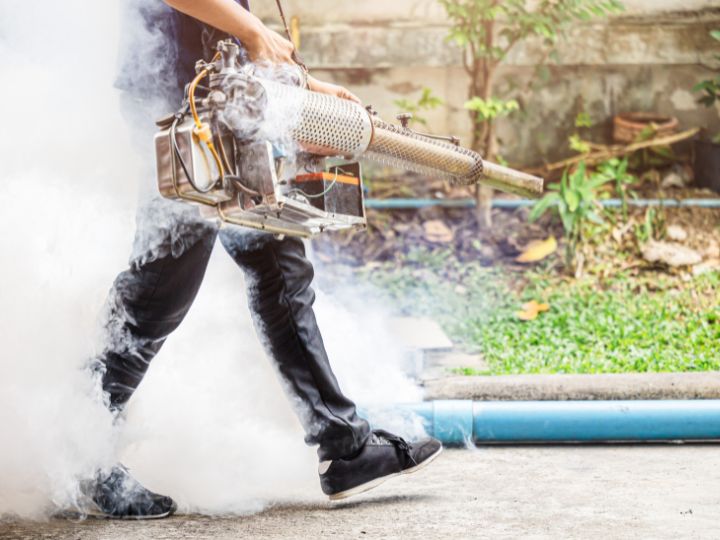How Weather Affects Pest Behavior
Spring and Summer: Peak Activity for Pests
As temperatures warm up in spring and summer, many pests become highly active. Ants, mosquitoes, wasps, and termites start foraging, breeding, and establishing colonies. Ants often enter homes in search of food and water, while mosquitoes breed in standing water from seasonal rains. Wasps and bees become more active, building nests and looking for food, and termites enter their swarming season, especially after rain followed by warm weather, which creates ideal conditions for new colonies.
Fall: Rodents and Spiders Seeking Shelter
With cooler temperatures in fall, many pests, especially rodents and spiders, begin looking for warmth and shelter indoors. Rats and mice are particularly active as they seek nesting sites in attics, basements, and wall voids, taking advantage of tiny openings to gain entry. Spiders also move indoors, where basements, garages, and attics provide sheltered spaces to catch insects and escape the cold.
Winter: Dormant Insects and Overwintering Pests
In winter, many insects enter a hibernation-like state called diapause, while others overwinter indoors. Cockroaches and silverfish find warm, damp areas inside homes—such as kitchens, bathrooms, and basements—while pests like cluster flies and boxelder bugs hide in wall voids and attics, occasionally emerging on warmer winter days.
Preparing Your Home for Pest Season
Seal Entry Points
Inspect your home for cracks, gaps, and holes around doors, windows, pipes, and foundations, and use caulk or weather stripping to seal these areas. This preventive step blocks access points and reduces the risk of pest entry, especially for rodents, spiders, and insects that seek shelter indoors.
Manage Moisture
Since many pests are drawn to moisture, it’s important to fix leaky pipes, use dehumidifiers in damp areas like basements, and keep gutters clear to prevent standing water. These efforts help deter pests like mosquitoes, cockroaches, and silverfish by removing water sources that attract them.
Eliminate Outdoor Attractants
Keep firewood, mulch, and debris away from the foundation of your home, as these can attract pests. Trim bushes and trees to reduce potential hiding spots and create distance from the structure, which limits access points for pests like rodents and ants.
Store Food Properly
During warmer months, pest activity around food sources increases. Store food in sealed containers, clean up crumbs, and remove trash regularly to avoid attracting pests such as ants, cockroaches, and rodents that are drawn indoors by accessible food.
Regular Inspections
Seasonal pest inspections with a professional can help you catch infestations early. Professional guidance on potential vulnerabilities around your home allows for targeted prevention, reducing the chance of pest issues developing.
Use Pest Barriers and Repellents
Applying barrier treatments or natural repellents around the perimeter of your home can effectively keep pests out. Essential oils, such as peppermint and citrus, are effective natural repellents for ants and spiders, while diatomaceous earth around the foundation helps deter crawling insects.
Weather-Specific Pest Preparation Tips
During Heavy Rain
Clear gutters to prevent water buildup, which can attract mosquitoes and increase termite activity around the foundation.
After a Heat Wave
Inspect your home for signs of insect swarms, particularly termites, as they often swarm after extended periods of heat.
In Freezing Conditions
Check that your home is sealed, especially around the foundation and attic, to prevent rodents from entering in search of warmth.
Conclusion
Weather conditions significantly impact pest behavior, but by staying ahead of seasonal shifts and implementing preventive measures, you can keep your home pest-free throughout the year. Understanding how different weather patterns affect pest activity enables you to take proactive steps to guard against insects and rodents as seasons change.
